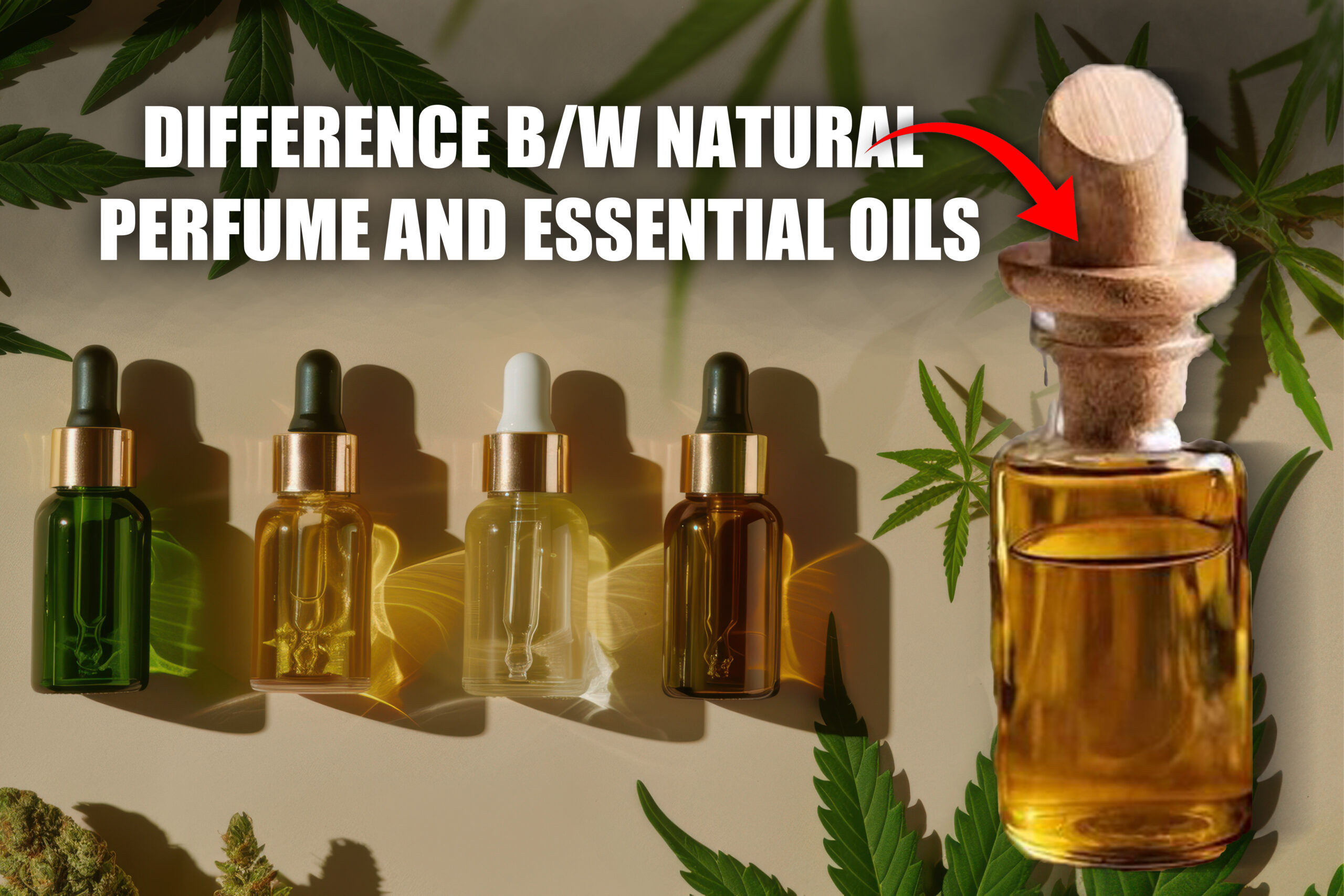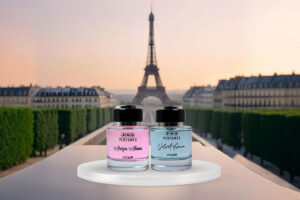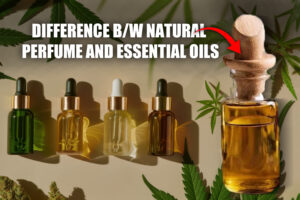As the desire for natural scents grows, many people face a dilemma: should they choose essential oils or natural perfumes? With Pakistan’s imports of essential oils and perfumes hitting USD 165.92 million in 2023, it’s clear that the interest in luxurious and natural fragrances is booming. However, understanding the differences between essential oil and natural perfume helps you to keep away from confusion and make an informed decision. This article reveals their unique purposes, helping you select the best match for your preferences.
Main Differences Between Essential Oil and Natural Perfume
When choosing between essential oils and natural perfumes, it’s important to understand how they differ. The table below highlights their unique features to help you make an informed choice:
| Feature | Essential Oil | Natural Perfume |
|---|---|---|
| Composition | Made from pure plant extracts without additives. | A blend of essential oils, natural isolates, and carriers. |
| Concentration | Highly concentrated and potent. | Diluted with carriers like alcohol or plant-based oils. |
| Purpose | Used for therapeutic benefits and holistic healing. | Created for personal fragrance and everyday use. |
| Fragrance Profile | Features single-note, natural scents. | Offers multi-layered, complex scent combinations. |
| Application | Requires dilution before applying to skin. | Pre-diluted and ready to wear directly on the skin. |
| Sustainability | Sourced directly from nature with minimal processing. | Crafted with eco-conscious formulations for sustainability. |
What Are Essential Oils?
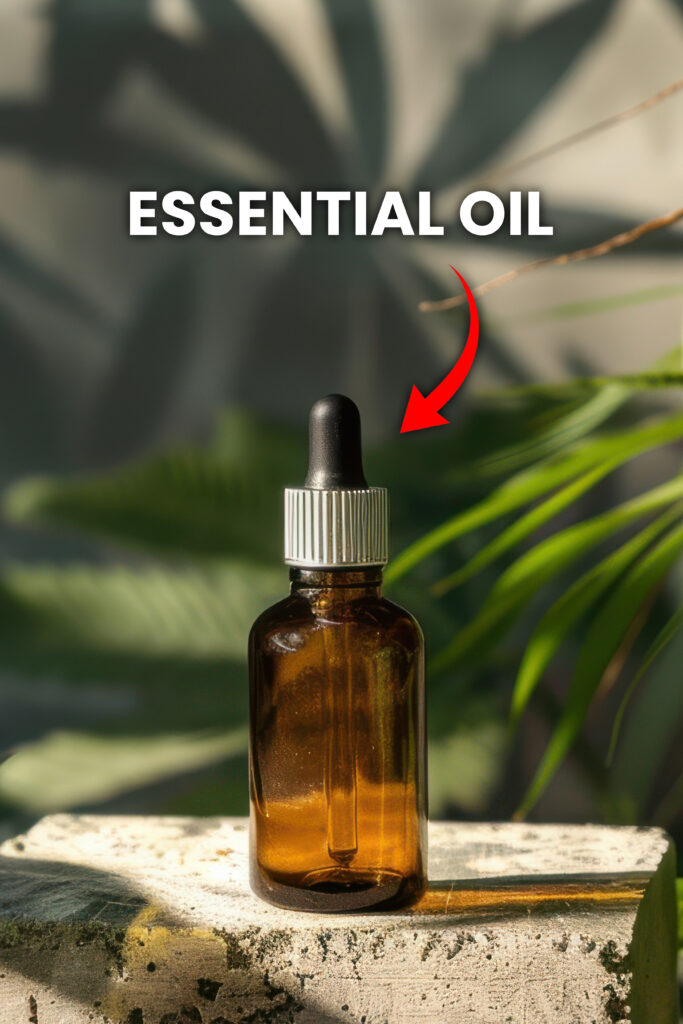
Essential oils are highly concentrated plant extracts obtained through processes like steam distillation or cold pressing. Known for their rich, natural aromas, essential oils capture the true essence of the plants they come from.
Characteristics of Essential Oils
- Pure and Potent: Essential oils are highly concentrated plant extracts, capturing the essence of their source.
- Natural Aromas: Each oil reflects the unique scent of the plant it is derived from, such as calming lavender or refreshing eucalyptus.
- Free from Synthetics: Typically, essential oils contain no artificial additives, preserving their natural quality.
- Therapeutic Benefits: They are known for their wellness properties, including stress relief, relaxation, and energy boosting.
- Versatile Uses: Essential oils are used in aromatherapy, skincare routines, and even as natural cleaning agents.
- Requires Dilution: Due to their concentration, they are often mixed with carrier oils before use.
Usage of Essential Oils
- Aromatherapy: Diffused to promote relaxation, improve mood, or enhance focus.
- Skincare: Used in diluted form to address acne, dryness, or inflammation.
- Household: Act as natural cleaning agents with antibacterial properties.
List of Essential Oils
This list of essential oils offers a wide range of scents and benefits to suit different needs.
- Lavender Oil: Known for its calming and relaxation properties.
- Peppermint Oil: Provides an energizing boost and enhances focus.
- Tea Tree Oil: Valued for its antibacterial and antifungal qualities.
- Eucalyptus Oil: Often used for respiratory relief and clearing sinuses.
- Lemon Oil: Adds a fresh, uplifting scent and acts as a natural cleaner.
Lasting of Essential Oils
The lasting power of essential oils depends on various factors, including the type of oil and how it is used. Lighter oils, like citrus (e.g., lemon or orange), tend to have a shorter lifespan and may fade within a few hours.
On the other hand, heavier oils like patchouli or sandalwood can last longer, often lingering for hours or even days. Proper storage also plays a role in preserving the fragrance. To extend the lasting of essential oils, it’s recommended to store them in cool, dark places and ensure they’re tightly sealed. Understanding these factors can help you enjoy the full benefits of essential oils for longer periods.
What Is Natural Perfume?
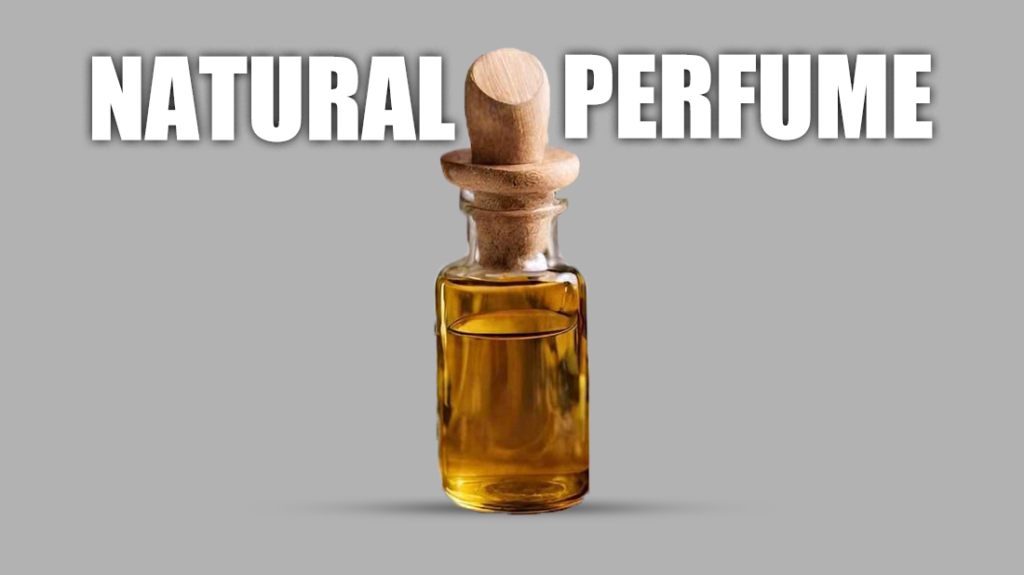
Natural perfume is a fragrance made from plant-based ingredients, essential oils, and natural extracts, without the use of synthetic chemicals or artificial additives.
These perfumes capture the essence of flowers, herbs, spices, and fruits, providing a rich, pure scent experience.
Characteristics of Natural Perfumes
- Botanical Ingredients: Made from essential oils, plant extracts, and absolutes.
- Chemical-Free: Free from synthetic fragrances, parabens, and alcohol.
- Gentler Scent: Often softer and more complex, with evolving floral, woody, and herbal notes.
- Eco-Friendly: Provides a cleaner, more sustainable option compared to traditional perfumes.
- Suitable for Sensitive Skin: Ideal for individuals looking for a fragrance that’s gentle on the skin.
Usage of Natural Perfumes
- Apply to pulse points like wrists, neck, and behind ears for an all-day scent.
- Some scents, like lavender, can help with relaxation, while citrus oils uplift the mood.
- Perfect for those with sensitive skin or allergies.
Types of Natural Perfumes
There are several types of natural perfumes, each with its unique composition and scent profile. Some common categories include:
- Floral: Made from flowers like rose, jasmine, and lavender, these perfumes offer fresh, sweet, and romantic notes.
- Woody: Scented with oils from trees like sandalwood, cedarwood, and vetiver, these perfumes are earthy, deep, and calming.
- Citrus: Refreshing and zesty, citrus-based perfumes often feature oils from oranges, lemons, or bergamot.
- Spicy: These perfumes contain notes of cinnamon, clove, or cardamom, offering warmth and richness.
- Herbal: Made from plants like basil, rosemary, or thyme, herbal perfumes provide a fresh, invigorating scent.
Lasting of Natural Perfumes
The longevity of natural perfumes can vary depending on the ingredients used. Since natural perfumes do not contain alcohol or synthetic chemicals, they tend to last shorter than their synthetic counterparts. However, heavier oils like sandalwood or patchouli can provide a longer-lasting fragrance, while lighter oils like citrus may fade quicker. To extend the scent’s duration, it’s important to store the perfume in a cool, dry place and apply it to moisturized skin.
While natural perfumes may require reapplication throughout the day, they offer a purer, gentler fragrance experience that aligns with a more natural lifestyle.
Fragrance Oil Vs Essential Oil in Different Products
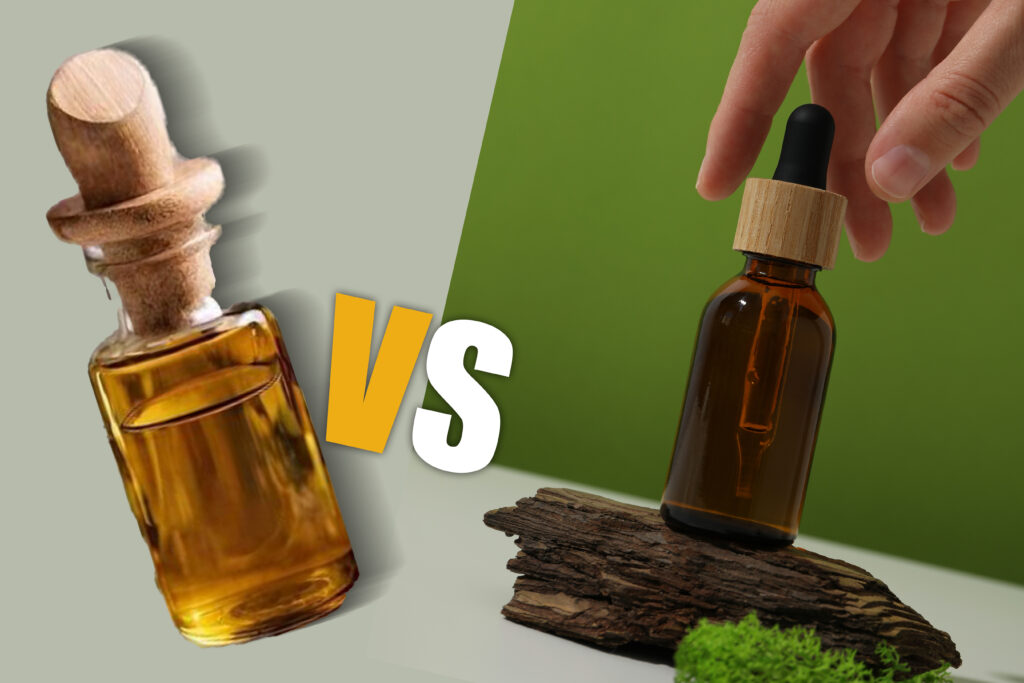
When it comes to scents in various merchandise, you’ll often come across fragrance oils and essential oils, but they serve different purposes and have distinct characteristics.
Fragrance Oils are artificial or a mix of synthetic and herbal ingredients, designed purely for scent. They are generally used in products like candles, soaps, and air fresheners due to the fact they tend to be lower priced and can create stronger, longer-lasting fragrances. However, since they’re no longer derived from plants, they do not offer the healing benefits that essential oils do.
On the other hand, Essential Oils are extracted from plants and are used no longer only for their perfume but also for their health and wellness benefits. They are mostly found in skin care products, aromatherapy, or even in a few cleaning supplies because of their herbal properties, like antimicrobial or calming effects. While essential oils may not usually have the same powerful scent as fragrance oils, they offer a greater holistic, plant-based approach to fragrance.
In short, fragrance oils are often used while the number one intention is a scent, even as essential oils are selected for both their aroma and their therapeutic properties. Each has its place in different products, depending on the desired effect.
Fragrance Oil and Essential Oil in Soap
When making soap, both fragrance oils and essential oils are commonly used to add scent. Essential oils bring natural, aromatic properties from plants, herbs, and flowers, providing a more organic, sometimes therapeutic experience. On the other hand, fragrance oils are often used when a stronger, longer-lasting scent is desired. They come in a wide range of fragrances that might not be possible to achieve with essential oils alone, like candy or bakery scents. While essential oils are great for sensitive skin, fragrance oils may be better for vibrant, complex scents.
Fragrance Oil and Essential Oil in Candles
In candles, essential oils provide a natural, subtle fragrance that can create a calming ambiance. These oils often contribute to the mood-enhancing properties of the candle, such as lavender for relaxation or eucalyptus for mental clarity. Fragrance oils, however, are more commonly used in candles for their ability to deliver a wide range of strong, long-lasting scents. They’re also more stable at higher temperatures, making them ideal for candles that require a potent fragrance throw. So, if you’re after a soothing, natural scent, essential oils are the way to go, while fragrance oils work best for stronger or more exotic scents.
Fragrance Oil and Essential Oil in Diffusers
When using oils in diffusers, both essential oils and fragrance oils have their benefits. Essential oils are popular because they’re derived from plants and often provide therapeutic properties, like stress relief or energy boost. They are perfect for creating a relaxing or invigorating atmosphere in your home. Fragrance oils, however, are made to mimic a much wider range of scents, from floral to tropical to sweet. They can fill a room with a fragrance that essential oils might not be able to replicate, such as sugary or fruity notes. Ultimately, if you’re looking for aromatherapy benefits, essential oils are the go-to, but for a diverse scent experience, fragrance oils might be the better choice.
Availability of Perfume Oil and Essential Oil
Perfume oils and essential oils are both widely available, but the variety and sourcing differ. Essential oils can be found in many natural health stores, online retailers, and specialty shops, often sourced from plants, herbs, and flowers. They come in various qualities, from pure to diluted forms. Perfume oils, on the other hand, are more common in commercial products and may be available in many fragrances that are synthetic or a blend of natural and artificial ingredients. While essential oils are generally available in health stores, perfume oils can be found in beauty stores and fragrance retailers.
Price of Fragrance Oil and Essential Oil
The price of fragrance oils and essential oils can vary significantly, with essential oils typically being more expensive due to the process required to extract them from plants. For example, rose oil and jasmine oil can be particularly costly because they require large amounts of plant material to produce even a small quantity of oil. Fragrance oils, being synthetic or blends, tend to be more affordable. While they may not offer the same natural benefits as essential oils, they are often a more budget-friendly option for creating fragrances in candles, soaps, or perfumes.
Fragrance Range of Fragrance Oil and Essential Oil
The fragrance range offered by fragrance oils is much broader than that of essential oils. Fragrance oils can be engineered to mimic almost any scent, from fruits and florals to candy or spices. This makes them highly versatile for creating unique, customized fragrances in a wide variety of products. In contrast, essential oils are more limited in their scent profiles because they are made from natural plant sources. While essential oils offer beautiful, pure scents like lavender, eucalyptus, and peppermint, they don’t have the wide variety or complex combinations that fragrance oils can provide.
In Short
As interest in natural fragrances continues to grow, many people find themselves debating between essential oils and natural perfumes. Both offer unique benefits, but they differ in key ways. Essential oils are pure plant extracts, often used for therapeutic purposes like relaxation and skincare, and require dilution before applying to the skin.
On the other hand, natural perfumes are crafted from a blend of essential oils, plant extracts, and carriers to create complex, multi-layered scents, ready to wear. While essential oils are highly concentrated and have a shorter-lasting scent, natural perfumes offer a gentler, longer-lasting fragrance experience without synthetic chemicals. Both options provide eco-friendly, skin-sensitive choices for those seeking a more natural lifestyle, with essential oils offering wellness benefits and natural perfumes offering a sophisticated fragrance for daily use.
Related Questions
1. Are Natural Perfumes Made from Essential Oils?
Yes, natural perfumes are often made from essential oils! In fact, essential oils are one of the key ingredients in creating natural fragrances.
These oils are derived from flowers, fruits, spices, and herbs, and they form the heart of natural perfumes. While some natural perfumes may include other plant-based extracts or absolutes, essential oils are the primary component due to their rich aromas and therapeutic benefits.
2. How to mix essential oils for hair growth?
To mix essential oils for hair growth, combine 3-4 drops of rosemary oil, peppermint oil, or lavender oil with 1 tablespoon of carrier oil like coconut oil, jojoba oil, or argan oil. Gently massage the mixture into your scalp to stimulate circulation and nourish hair follicles. Leave it on for at least 30 minutes before washing it out. Use 2-3 times a week for the best results!
3. How to Make Essential Oils Easy?
Use a simple steam distillation method with a pot, water, plant material (like lavender or citrus peels), and a collection bowl. This process extracts the natural oil from the plants.
4. How Can I Use Essential Oils in the Shower?
Add 5-6 drops of essential oil to a damp washcloth or sprinkle them in the corners of your shower. The steam will release the aroma, creating a relaxing, spa-like experience.
5. How to Dilute Essential Oils with Coconut Oil?
Mix 1-2 drops of essential oil with 1 teaspoon of melted coconut oil. This dilution makes it safe for the skin while still delivering the oil’s benefits.
6. How to Make Candles with Essential Oils?
Melt soy or beeswax, then stir in 20-30 drops of your favorite essential oil. Pour the wax into molds or jars with a wick to create beautifully scented candles.
7. How to Make Perfume Without Essential Oils?
Combine fragrance oils with a carrier like jojoba oil or alcohol. This mixture gives you a custom fragrance without needing pure essential oils.
8. How to Extract Essential Oils from Orange Peels?
Use a steam-distillation setup or simmer orange peels in water to release their natural oil. Collect the oil that rises to the top or condenses.
9. How to Make Rose Water Toner with Essential Oil?
Mix 1 cup of distilled water, 2 tablespoons of rose water, and 3 drops of rose essential oil. Store it in a spray bottle for a refreshing, hydrating toner.
10. How to Make Long-Lasting Perfume from Essential Oils?
Combine 20-30 drops of essential oil with a carrier oil (like jojoba) and a fixative (like vanilla extract). Let it age in a sealed glass bottle for a few weeks.
11. How to Make Essential Oils at Home Easy?
In a crockpot, add water and your chosen plant material, and let it simmer. Use a lid with a condensation setup to collect the extracted oils easily.
12. How to Make Natural Perfume at Home?
Blend 30% essential oils with 70% alcohol and a few drops of glycerin. Let the mixture sit in a cool, dark place for 2-4 weeks to enhance the scent.

